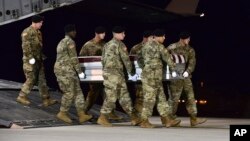The Pentagon said Wednesday that Islamic State fighters were responsible for an attack in southwestern Niger that killed four American soldiers, as new details suggested local villagers might have played a role in the ambush.
Army Lieutenant Colonel Michelle Baldanza, a Pentagon spokeswoman, told VOA that IS militants ambushed U.S. and Nigerien forces during the October 4 firefight that also killed four of Niger's security personnel.
U.S. Army Special Forces, also known as Green Berets, had just completed a meeting with local leaders and were walking back to their vehicles when they were attacked, according to a U.S. official, who spoke to VOA on the condition of anonymity because the investigation was ongoing.
The soldiers said the meeting ran late, and some suspected that the villagers were intentionally delaying their departure, the official said.
Niger's defense ministry has confirmed the firefight occurred near the village of Tongo Tongo in the Tillaberi region. Eight other Niger troops were wounded in the attack, and two American troops were wounded and airlifted to Germany for medical treatment.
Defense Secretary Jim Mattis told reporters Wednesday that the patrol had been "hit hard" in an area where enemy forces had not operated and that French planes with bombs attached were overhead within 30 minutes of the ambush.
"I completely reject the idea that that [the response] was slow," Mattis said.
Strategic ally
Niger is a key U.S. ally in the fight against terrorism and is situated in a dangerous region of the Sahel plagued by multiple extremist groups and traffickers, said Lisa Mueller, an assistant professor of political science at Macalester College in Minnesota and an expert on politics in the area.
Under President Barack Obama, the U.S. built drone bases in Niger's capital, Niamey, and in the northern town of Agadez. The U.S. has about 800 service members in Niger to provide support for the U.S. Embassy and counterterrorism training for government forces battling Islamist militant groups.
"The United States has provided support for the military of Niger, especially in the way of training forces to combat multiple terrorist groups that have encroached into Niger from several of the country's borders," Mueller said.
Niger faces threats from Nigeria-based Boko Haram along its southern border and Algeria-based al-Qaida in the Islamic Maghreb along its porous borders to the west and north. Pockets of Islamic State fighters operate in the west.
"Really, from almost all sides, Niger is facing attacks from armed extremist groups," Mueller said. "And, because the government of Niger has been a strong ally to the counterterrorism efforts, it's been natural for the United States to station its counterterrorism forces in that country."
Caught off guard
Army Colonel Mark Cheadle, U.S. Africa Command spokesman, said in a conference call last week that the military was "resolved and stalwart in our efforts to go after those who attacked us."
The Pentagon also said it was re-evaluating its force protection measures in the region.
"We will look at this and say: Was there something that we have to adapt to now? Should we have been in a better stance?" Mattis said. "We're not complacent. We're going to be better."
Mueller, who has traveled and conducted research in Niger, said radicalism in the country is mostly imported from surrounding countries, but that could change.
"Islam in Niger has, for generations, been very tolerant, been very resistant to radicalization, especially compared with societies elsewhere in the Sahel," she said.
"It's not guaranteed that that won't change, and there are some hints that especially youth in certain regions of Niger are more receptive to radical recruitment. But it's not the overwhelming trend as of now, and so I just want to underline that terrorism in Niger is largely a matter of foreign policy and not of domestic concerns."




